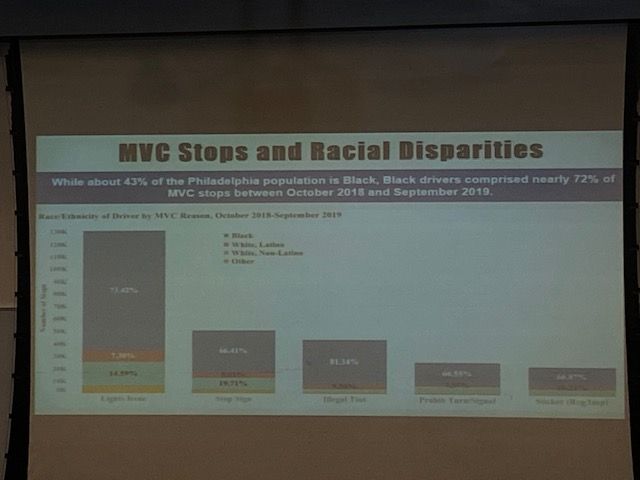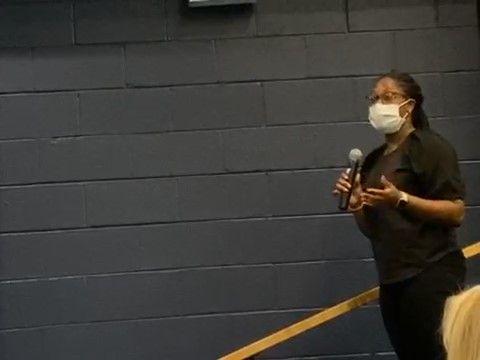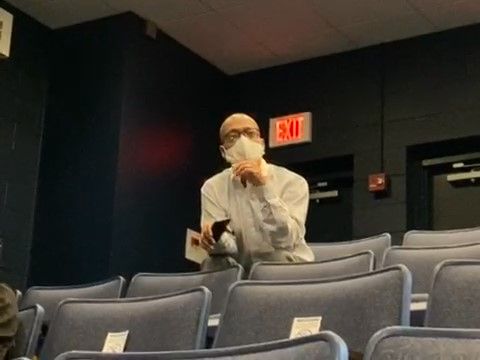If you know better, you do better, one of the panelists who spoke at a panel discussion on Race in America said.
Moderator Dr. Chioma Ugochukwu, provost and vice president of Academic Affairs, COVID-19 has revealed the racial disparities in America, especially within the African-American community. The discussion about race in America was held during the common hour in the Widener Lecture Hall on Wednesday, Sept. 16.
Three Black women from the Philadelphia area were invited as panelists to discuss the racial issues currently happening in America. Chief defender Keir Bradford-Grey; radio host, columnist and child advocate Andrea Lawful-Sanders; and assistant professor of teacher education Zakia Y. Gates were invited as panelists for the discussion about race in America, specifically relating to the Confederate flag, driving while Black, police brutality and the criminal justice system, “Karens,” COVID-19 and vaccines and hope for the future.
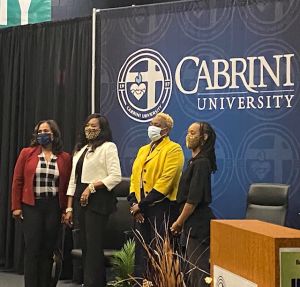
Photo by Layal Srour.
Confederate Flag
Keir Bradford-Grey, a chief public defender in Philadelphia, spoke about the meaning of the Confederate flag to African Americans.
“Symbols are important. Why would people be fighting for symbolic expression if it wasn’t very important,” Bradford-Grey said.
While Bradford-Grey is all for standing up for what you believe in, understanding why you believe in something is a critical component. Comments made about relatives or loved ones were brought to the surface to understand the logic behind her argument.
“Justifying the fact that an uncle or a great-grandfather might have had this flag, I would have to face the ugly truths with my family that really supported what this flag stood for,” Bradford-Grey said. The heritage that families have blurred out behind this flag, for so many years is where lies the issue, according to Bradford-Grey.
Remaining open-minded and remaining willing to be educated on this topic, is what the context of the argument boils down to, she said.
Dr. Zakia Y. Gates, assistant professor at Cabrini University for education, chimed in on the topic of the Confederate flag as well.
“I would like to speak on behalf of the context of the past,” Gates said.
Gates brought into play the Holocaust and the Titanic, as examples of things we never forget.
“Slavery, oh it was such a long time ago, just scoot over,” Gates said sarcastically.
If slavery was so long ago and people want to forget about it, why is it acceptable to bring up the Confederate flag which was tied in to that period? The argument being portrayed by Gates, is all about fairness. Gates emphasizes everyone is welcome to speak about their ancestors and the past in general.
Driving While Black:
The topic of driving as a Black man or woman is a critical discussion that was addressed during the seminar. It was during the period October 2018 to September 2019, in which Bradford-Grey’s legal team examined 309,000 traffic stops. Of these stops, 73 percent were made up of Black individuals.
“You are using this policing as an effective tool to promote crime or to solve crime or promote public safety and how effective has that been for you?” Bradford-Grey said.
Bradford-Grey expanded on how the Black culture is supposed to react. When the statistic about Black drivers appears, Black individuals are bound to resist arrest out of fear for their lives.
Police Brutality and Criminal Justice System
“How do we explain notions like ‘Defund the Police’? What does that really mean?” Bradford-Grey asked.
According to Bradford-Grey, this phrase is getting to the heart of what police departments are doing that are not promoting safety but actually agitating citizens and causing situations to escalate especially with the Black community.
When researching the history of racial inequality and mass incarceration in the United States as according to the documentary, “Thirteenth,” Ugochukwu stated that the 13th Amendment, which abolished slavery, actually had a loophole in it. That loophole was for the punishment of crime.
“So basically, the states can use you as a slave, if you committed a crime,” Ugochukwu said. “People started arresting Blacks for minor offenses like loitering, vagrancies.”
Bradford-Grey commented that writing in a codified language that a person can be used as a slave if they are incarcerated is unthinkable and should just be taken out.
“If this is about punishment and rehabilitation, then let it just be about that,” Bradford-Grey said. “The minute you bring industry in it, you start to have corruption.”
Bradford-Grey believed that the purpose of having a large number of inmates coming into the system with nonviolent crimes against them shows that it is all to protect the business of the prison industry. She continued to say that a simple Google search can reveal which businesses have contracts for prison labor. According to Bradford-Grey, in Pennsylvania, there are 935 legislative actions that are able to exclude people from being able to partake in certain aspects of life for committing a crime or having a criminal offense against them, which resorts to these same people having to find work at low-paying jobs and keeping the leaders of the big corporate industries rich.
“When you’re able to label people where you are legally able to discriminate against them, you leave them subjected to the corporate interest that everyone knows feeds what the prison system feeds,” Bradford-Grey said.
Gates entered into this discussion by stating that she dislikes the term “mass incarceration” because of the disproportion between people of color in prison compared to white people. There is a much higher proportion of people of color in the American prison system and a very low number of white people who are incarcerated.
“When I saw [“Thirteenth”], I started to see these little elements explaining how slavery did not end,” Gates said. “It was just transformed and transferred to other institutions and entities and prison is one.”
Gates continued to list other institutions that slavery was transferred to, such as schools and the music industry. She said this is where she sees Black bodies be used for labor. Gates also mentioned that in another documentary by Crazy Bone that Crazy Bone exposes the music industry and explains how rap and hip-hop artists have changed to be more gangster and violent and how that leads to money, economics and prisons.
Lawful-Sanders then added with her own experiences that she and her sons have had with police officers. She mentioned how she had to fight to get her son into the honors program at his college and to fight a traffic ticket he had received for a violation that did not exist.
“When we sit on these panels and we are having discussions about what the marginalization of Black and Brown people look like, we can give you all the data in the world, but those stories make all the difference,” Lawful-Sanders said.
Lawful-Sanders continued to say how her adult sons call her once a week to tell her how some of the situations that they experience as African-American men are traumatic. She mentioned how she has white co-workers who do not understand the trauma that Lawful-Sanders has experienced as a Black woman in America who they ask for her help to be anti-racist.
“It’s common sense. There’s just some things you shouldn’t do,” Lawful-Sanders said. “If you have a good moral code and you have a conscience about the things you say or do, then you would stop doing half the things, and you wouldn’t turn a blind-eye to the kinds of things that are going on around us out here.”
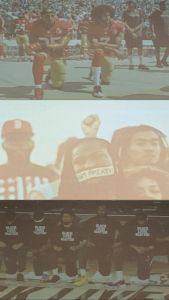
Ugochukwu then turned to the topic of the excessive use of force by police officers and the need for police reform. She explained that each time this topic is brought up, that people think it is about being anti-police, but it is actually about police reform. She brought up the examples of Eric Garner, Philando Castile, Laquan McDonald and Jacob Blake in which they were harmed or murdered by police officers using excessive force.
Gates commented about the fallacy behind the “Black-on-Black crime” argument.
“I realize that when people are losing the argument of police brutality, then they bring up the ‘Black-on-Black crime’ fallacy argument,” Gates said. “‘Black-on-Black crime’ does not exist. It’s just called proximity crime, [which is] where you live.”
Gates continued to say that by bringing up the “Black-on-Black crime” fallacy is essentially justifying police brutality due to the notion that Black people commit crimes against each other. She said that the police job is supposed to be about protecting and serving the community and to prevent people from committing crimes against each other despite the police officer’s own race.
Bradford-Grey brought up that African-American boys are seen as more violent and more aggressive, which causes people to be afraid of them. She continued to say that police officers, who swear to protect and serve people, do not spend enough time around Black communities to understand their behavior, mannerisms and habits. She says that part of the problem is that people have a pre-conceived image of African-American men from the media, particularly in rap culture, because it distorts their understanding of the Black community. Bradford-Grey believed those entering the police force should be asked character questions such as how many Black people they have engaged with throughout the duration of their life as well as the questions that are asked when they take the Civil Service Exam because it would help ensure that incoming officers would not treat one community differently than another community due to biases.
“Now we are seeing legislation happening across the country,” Bradford-Grey said. “That is banning the use of choke holds because it’s been so callously used against us, even when you see us struggling for our last breath.”
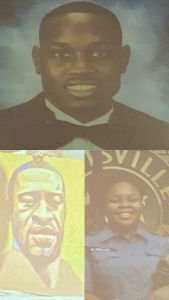
Lawful-Sanders then discussed that the first time an African-American child has access to law enforcement officers is when they are in school by a teacher. She mentions that according to the UNCF, those children begin to be seen as adults by the age of 10 and are visualized as grown men. Lawful-Sanders mentioned that 98 percent of educators are white in the school system and has helped to train white educators to be anti-racist because teachers are usually the first point of contact with law enforcement. She encourages anyone who is planning on becoming an educator to study other cultures and their families for this reason.
“Karens”
The term “Karen” has become popularized over the past few months and is used as a visual archetype for the privileged, middle-aged, white woman. Ugochukwu asked the panelists to discuss if the “Karen” archetype is sexist, useful or does any good at all.
Lawful-Sanders discussed her experience as an anti-racist trainer and discussed how a group of white women had confided in her that they thought no woman should become the president of the United States or have that much power. She said that they had discussed this with their husbands and families and told them that they would vote for a female president but do not believe that a woman should hold that much power. Lawful-Sanders continued to say that many Black women feel the same way that women should not hold a lot of power because that is what their church leaders tell them. However, Sanders did mention that white women feel alarmed that Black women because they feel Black women have a sense of authority. White women feel that Black women can do certain things that they cannot do, so they cry and pretend to be hurt and offended and say that Black women are too aggressive or too passionate. Lawful-Sanders said that white women understood that those were weapons that they used for many years and continue to use them as weapons now.
“Unfortunately for them, whether you call them a ‘Karen’ or an ‘Amy’ or whatever else, Black women have been sitting in our living rooms and fighting [in] amazing ways to work around, through, over and under. Before it became public knowledge,” Lawful-Sanders said.
Lawful-Sanders continued to say that she would simply tell these “Karens,” who weaponize their femininity to hurt other people, is to grow up, face the consequences of their actions by acknowledging when they are wrong and to use mediocrity to get to where they need to be.
“There are Black people, Black women, who have PhD’s, double masters and everything else in between that have found themselves working for these white women; some of them who have held them back from getting into positions,” Lawful-Sanders said.
Lawful-Sanders explained that these “Karens” are weaponizing their femininity and whiteness to stop things from progressing forward.
Gates then recalled her own “Karen” experience from years ago, where she applied to work at another charter school. Shortly after she was interviewed and sent in her references, she received a call from an HR representative that the principal at the school she applied to work at was not sure to hire her because he was told from the principal of the school she was currently working at that time Gates was not a very good teacher and a slacker. However, Gates had worked at that school for four years and had a great record at that school. She was upset by this new information and tried to handle this situation herself, but her instincts told her not to because it would impact her health and she has a daughter. She then made the decision to call the assistant of the CEO later that night and explain the entire situation to him. He then called the CEO and asked Gates to then tell the CEO the situation. The CEO then said that he would handle the situation. The next day, the CEO called Gates to let her know that she was hired for the job at the charter school and the principal at her previous school was fired.
Bradford-Grey believes the behaviors of a “Karen” deserves a label because it needs to stop due to the impact that it has on the lives of African Americans. However, Bradford-Grey noted that not all white women that behave this way, but the privileged white women that do behave like “Karens” are not the only ones to act this way. Privileged white men behave this way as well. She believed that only discussing the behavior of privileged white women and not privileged white men is sexist, but does believe that this behavior needs a label for everyone who acts like a “Karen.”
Lawful-Sanders then commented that in her experience many white men have been helpful to her and her peers. She explained that it is usually white men that have helped her further herself in her career. Sanders continued to say that many other women have told her that it was white men that have helped them reach higher positions in their careers as well.
COVID-19/Vaccine
The topic of discussion in regard to vaccination was addressed as well by these women. “I am not trying to tell people of color to not get a vaccine for Covid-19,” Bradford-Grey said. “However, I would like people of color to do their research before following through with getting the vaccine themselves.”
With advertisements and commercials calling for volunteers for the Covid-19 vaccine, Bradford-Grey is aware of this message strictly being pushed towards poorer communities and to those of color. Andrea Lawful-Sanders, who grew up in Jamaica, was surrounded with only black doctors.
“Everybody, including all of the doctors and teachers, they were all Black when I was growing up,” Lawful-Sanders said.
When Lawful-Sanders came to this country, she was not afraid to fire doctors who she believed were misunderstanding her or wronging her, there were no issues with moving along.
“I choose to work with people who choose to understand my body and what I am going through,” Lawful-Sanders said.
Hope
At the end of the conversation, Ugochukwu asked the panelists what gives them hope for the future.
Bradford-Grey was the first to respond by stating that the people of various races were in attendance at the event and were willing to listen to these conversations in an open and honest manner is what gives her hope because she believes that a conversation and a level of understanding is where everything starts.
Lawful-Sanders said that knowing that so many young people are not content with doing business as usual like their parents gives her hope because she sees the way that young people have been helping to change things, and she can see that change is coming.
Gates said that seeing the young people attending the event to discuss race in America and protesting in the streets gives her hope because they are becoming more conscious about the politics and social issues surrounding race in America.
“The system is broken and it’s going to take the young people to fix it. We need new ideas and new life,” Gates quoted Prince.
Bradford-Grey encouraged people to do research and educate themselves because it is hard to discuss race in America if someone does not know the history of racism and how it evolves.
“Listen more, empathize and hear what is coming from people,” Lawful-Sanders said. “Ask how you can help and then do it.”

